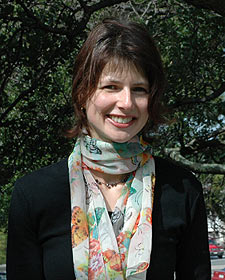Berkeleyan
"But what I'd really like to do is..."
 Sandra Wulff (Deborah Stalford photo) |
Everyone knows somebody like that: the guy in the IT department who covets a career in music; the accountant who'd rather teach yoga. Many people, maybe even most people, secretly wish they could do something else. But they don't. They carry on balancing accounts, eradicating computer viruses, and constructing porches; harboring the unfulfilled dream.
Career counselors meet those people daily. They ask their clients "What is your dream job?" And then, "What do you need to do to achieve it?" as if it's a logical formula. You identify the goal, develop your talents, enroll in training courses, whatever it takes, and live your fantasy. But what then?
My friend Mary is a writer. She sold her first novel to a major publishing house. But what she'd really like to do is ... well, be a writer. Met with inevitable "oohs" and "ahs" and "I wish I could do thats," Mary reacts with disdain. "Well do it then! Do you think it's easy? It's work." She's just as discontent as anyone else. "I am so bored," she complained recently. Of course she is! She's living the dream.
In her book Against Love, A Polemic, Laura Kipnis quotes German sociologist Georg Simmel, who said "love has the tendency to expire with the fulfillment of its yearning. If love lies on a path from not having to having, then possessing what you wanted changes the nature of the enterprise - and along with it the pleasure in it." Or, as Kipnis simplifies it, "Once you have something, how can you want it?"
Mary-Lou Weisman acknowledged this in a recent New York Times article describing her years-long unfulfilled desire to learn French. "So what if I'd wanted to do this for decades? Maybe all I wanted was to keep on wanting to learn French, not to actually learn it." Having finally spent a summer studying French, Weisman's altered aspiration is mastery - something she says she's in no danger of achieving.
Maybe doing what we'd really like to do should not be the goal at all. Perhaps that should just be dabbled in, like a love affair; elusive and lusted-after. Even those who are doing what they love should cherish a dream of doing something else; something they'd really like to do... but never quite do.
